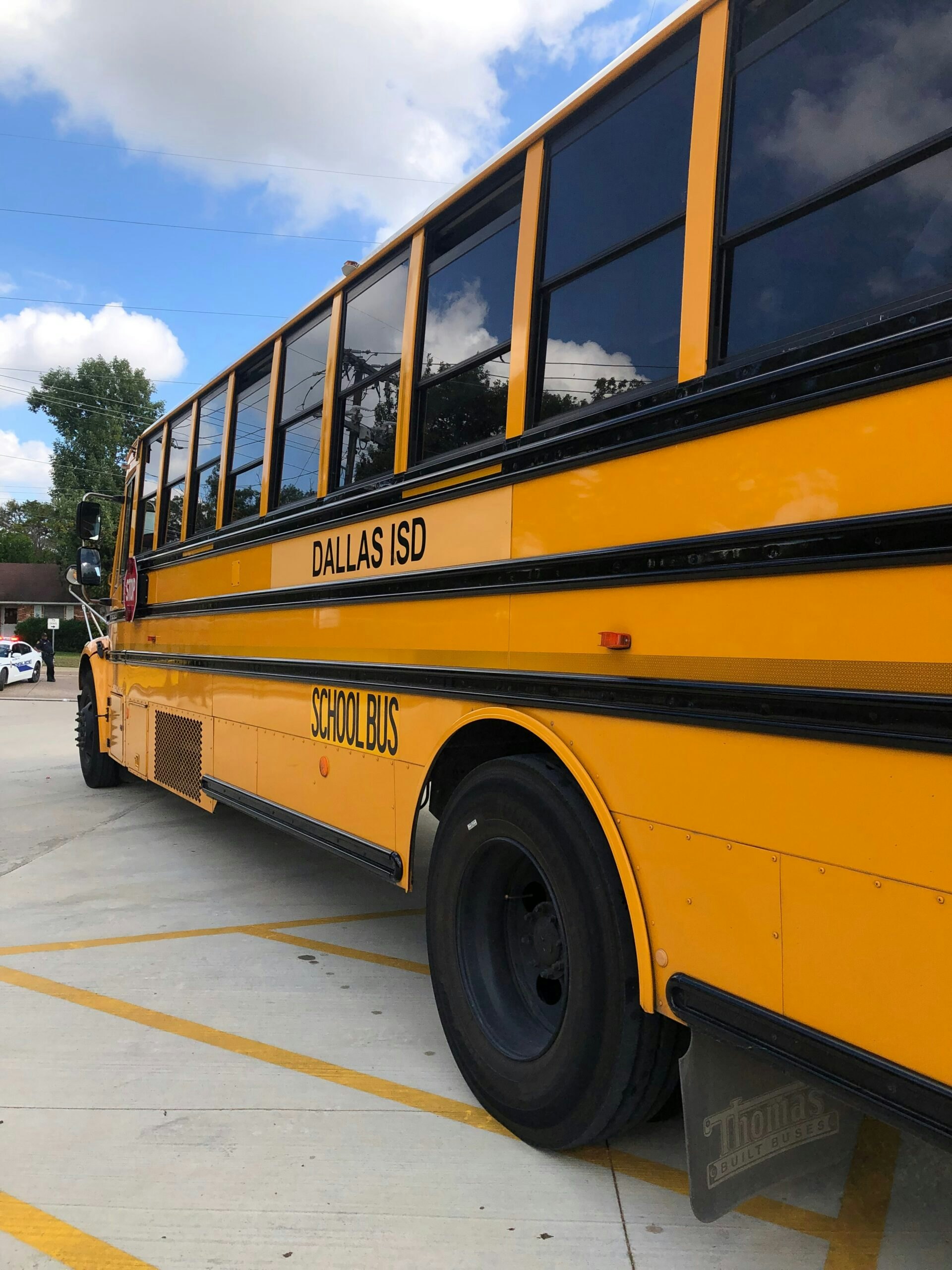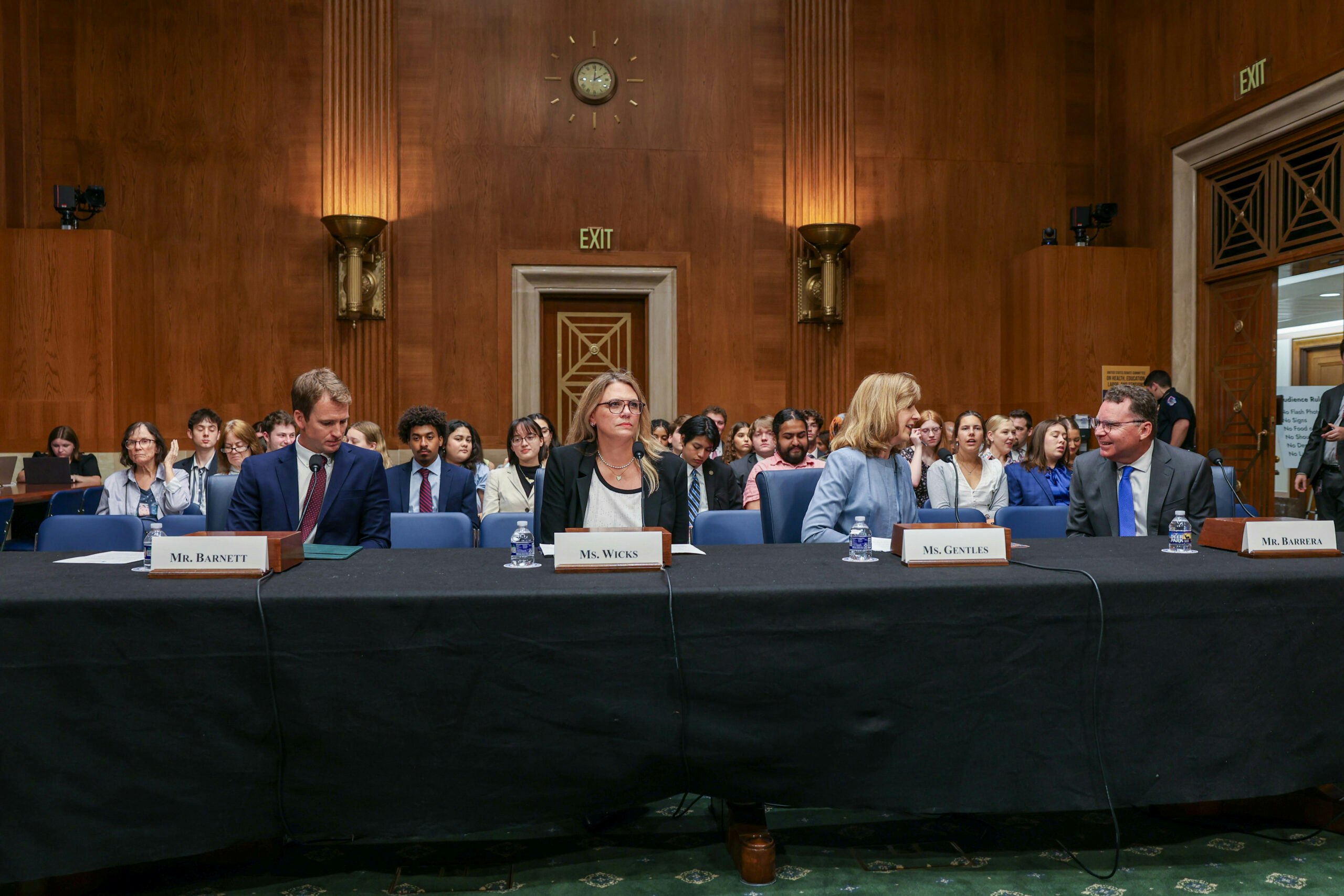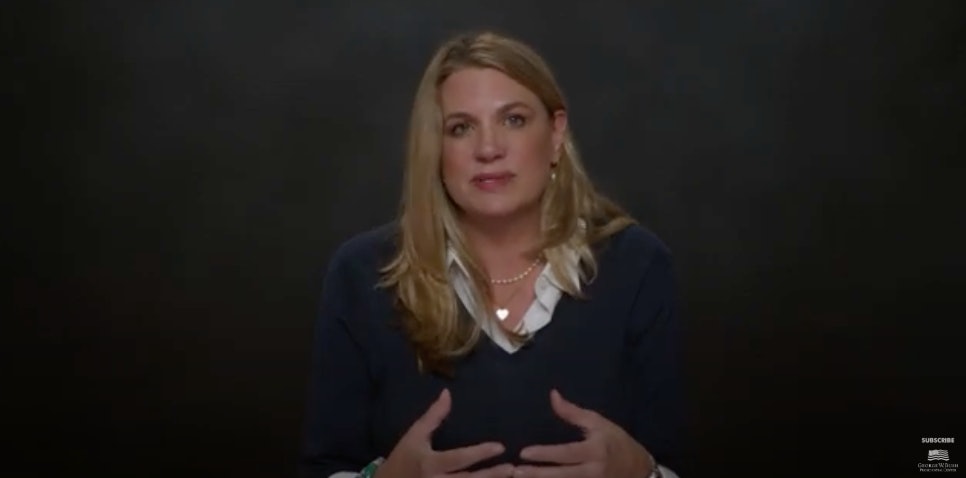"Equal opportunity is a unifying national purpose, but it is not a natural condition... It is the continuing goal of education reform – and it really is the continuing work of the civil rights movement."
Remarks by President George W. Bush
at The Civil Rights Summit
Lyndon Baines Johnson Presidential Library
Austin, Texas
April 10, 2014
Thank you. (Applause.) Be seated. Thank you all very much. It is an honor to be back to the LBJ Library. Last time I was here I introduced my mother, which is a pretty tough task. (Laughter.) You know, I’m impressed by the new renovations, Mark. I want to thank you for showing them to me. Former Presidents compare their libraries the way other men may compare their, well… (Laughter.) Just wondering how LBJ would’ve handled that. (Laughter.)
He was a funny guy at times. (Laughter.) The President today quoted one of my favorite LBJ lines when he said, “If one morning I walked on water across the Potomac River, the headline that afternoon would read, ‘The President Cannot Swim.’” (Laughter.)
The real influence of a President is not found in the headlines. It can only be judged with time. And at the distance of a half century, we know – with complete certainty – that America is a more just and generous country because LBJ set his mind and will to the cause of civil rights. (Applause.) I’m honored to be here and so is Laura. (Applause.) Thank you all for having us, Mark. (Applause.) We don’t need to get carried away. (Laughter.)
Thrilled to be here with the Johnson Family. Thank you all very much for your hospitality. Linda and Lucy — we’re members of the sibling club. (Laughter.) And Bill Powers, President of UT, greeted us. Thank you, Bill for your service here at the University of Texas. And David Ferriero is here, the Archivist.
Margaret Spellings, Secretary of Education when I was fortunate to be President, and I know she’s here somewhere… Not that great a seat. (Laughter.) But you’re important to me. (Laughter.) After all, she is the President of the George W. Bush Presidential Center. (Laughter.)
The civil rights movement required the spiritual and moral leadership of Reverend Martin Luther King, Jr. It required the courage and sacrifice of protesters who walked toward water hoses, and dogs, and police batons. But, in the end, it also required a legislative strategist of uncommon determination and skill to translate the demands of conscience into the words of law.
Within days of John F. Kennedy’s murder, the new President decided that his first order of business would be civil rights. He would turn a nation’s grief toward a great national purpose. In fighting for the Civil Rights Act of 1964, President Lyndon Johnson called the party of Lincoln to its best traditions. He called on his fellow southerners to lay down the heavy burdens of their past. He affirmed the essential role of the federal government when other levels of government fail in their primary duties. He made one principle clear for all time: A segregated society can never be a successful society, because the only success worth having is achieved together. (Applause.)
Martin Luther King, Jr. called the Civil Rights Act, along with the Voting Rights Act, “a second emancipation.” Lyndon Johnson was continuing the work of Abraham Lincoln, which is really the work of the Declaration of Independence: “All men are created equal.” And through these efforts, LBJ earned the highest compliment a democracy can provide: He made us one people.
I’ve got great respect for the way President Johnson used the Presidency to achieve big goals. He understood the risk for his party and the risk to his coalition in pushing civil rights. No one knew politics better. Yet when challenged, he responded: “Well, what the hell’s the Presidency for?” Every generation of Americans will look back at the Civil Rights Act and say: This is what the Presidency is for. (Applause.)
It is not a coincidence that many of the defining struggles of the civil rights era – from Little Rock Central to the University of Mississippi – took place in educational settings. Those who engage in oppression and exploitation always deny real learning. Those who fight oppression always insist on equal education. Through civil rights laws, we assure justice in the present. Through education, we secure justice for the next generation.
King knew this. He called education “the road to equality and citizenship.” Both these destinations are very important. Education provides the skills necessary to expand horizons and allow for economic success. Education also exposes young men and women to the great ideals of our heritage – liberty and responsibility, participation and patriotism. And in so doing we secure our democratic way of life.
Lyndon Johnson also knew the centrality of education to civil rights. At the age of 21, while working his way through San Marcos Teachers College, LBJ taught fifth, sixth and seventh graders in Cotulla, Texas. His students were the impoverished children of migrant workers. Can you imagine the experience of being an 11-year-old who forgot your homework and tried to explain it to Lyndon Johnson? (Laughter.) I suspect the Johnson Treatment was pretty good for classroom discipline. (Laughter.)
For the rest of his life, Lyndon Johnson credited this experience in Cotulla as his first lesson in poverty and prejudice. And it helps explain the passion he brought to the issue of education. In 1965, he convened the White House Conference on Education. The same year, he pushed through the Elementary and Secondary Education Act, which focused new funding on the worst inequities, and made support to school districts contingent upon nondiscrimination. He passed the Higher Education Act and Head Start.
In 2007, to recognize his enduring influence, I signed a law naming the Education Building in Washington after President Lyndon Johnson. (Applause.) And it was my honor to welcome the Johnson family – all of them – to the Oval Office. (Applause.) But, I was particularly honored to have made the phone call to your mother – one of the great ladies in Texas history and in our country’s history as well. (Applause.)
The 1960s began a limited role for the federal government in American education. The results have been better than some have claimed – and worse than many had hoped. These programs – particularly Title 1 – helped break down the dual educational system in the South. Poorer states have made some progress relative to richer states. Since the 1970s, achievement gaps between whites and minorities have narrowed.
During the last 50 years, educational progress has been generally positive – but completely insufficient. Education in America is no longer legally separate, but it is still not effectively equal. Quality education for everyone, of every background, remains one of the most urgent civil rights issues of our time. (Applause.)
Beginning in the 1990s, many states, including the greatest state – that being Texas – lost patience with the pace of change. These reform efforts gathered into a national accountability movement and culminated in the bipartisan effort called No Child Left Behind. It is a rare kind of issue that could unite Ted Kennedy, me, and George Miller. Somebody told me Miller is here. Was here. Awesome guy, by the way. We found common ground: Schools must demonstrate improved results on reading and math for minority children – or face consequences if they don’t. It is hard to imagine that anything so basic could be so controversial. It was, and it still is.
Between 1999 and 2008, reading scores for African-American 9-year-olds increased about two grade levels. Math scores for Hispanic 9-year-olds rose about the same. The achievement gap was closing. Sadly, the gains have stalled.
No law is perfect. Every legislative instrument eventually requires adjustment. But the problem comes when people start to give up on the goal. Some have ideological objections to any federal role in education. Some are too comfortable with the status quo. The alliance between ideology and complacency seems to be getting stronger. I fear that the soft bigotry of low expectations is returning. And for the sake of America’s children, that is something we cannot allow.
Let me focus on one fact that is uncomfortable even to contemplate. According to the most recent testing, the average reading score for a white student at age 13 is about the same as an African-American at age 17 – that’s a four-year, four-grade achievement gap. In an economy where higher skills are ever more necessary, that is scandalous. In a nation dedicated to equal opportunity, that is scandalous. Among the political heirs of King and Johnson and Dirkson and Humphrey, this should be a national scandal, demanding action. (Applause.)
None of the solutions are easy. We don’t have, and should not have, a federal education system. Power and responsibility are properly spread on many levels – so the need for reform and creativity is spread on many levels. And sometimes teaching professionals feel trapped in the same massive, immutable structures as parents and children.
But whatever difficulties we face, they will not be addressed by weakening accountability. There is a growing temptation among public officials in both political parties, at the federal, state and local level, to lower expectations. But any education gains we make will eventually be undermined by lowering our sights in the classroom. Without meaningful accountability, our sights into reality will be dimmed. Without meaningful accountability, it is poor and minority children who suffer the most.
The goal of ending achievement gaps should unite Republicans and Democrats. It should unite teachers and parents, business leaders and civil rights leaders. It should unite anyone committed to a reasonable assessment program, transparency with results, and holding the system accountable – anyone who believes in unleashing local creativity while maintaining clear measures and objectives. There is a needed federal role – it is not to dictate methods, but to help educate poor, minority, and special education children. But when we invest taxpayers’ dollars, it is only right to insist upon results. (Applause.) And when we find poor results, it is only right to blow the whistle on mediocrity. (Applause.)
Equal opportunity is a unifying national purpose, but it is not a natural condition. It must be purposely and carefully built by every generation for the next generation. It is the continuing goal of education reform – and it really is the continuing work of the civil rights movement. It is central to our efforts at the Bush Institute, and central to the legacy of the 36th President.
When Lyndon Johnson returned to Cotulla as President – must’ve been quite a scene – and spoke at the elementary school where he had taught 38 years before, here’s what he said, he said: “In that year, I think I learned far more than I taught. And the greatest lesson was this one: Nothing – nothing at all – matters more than trained intelligence. It is the key not only to success in life, but it is key to meaning in life. And that is true for a nation, too.”
On the issue of education, we are dealing with the meaning of America, and the extent of its promise. And in this cause, the passion and energy of Lyndon Baines Johnson still guides us forward.
Thank you. (Applause.)
END
























